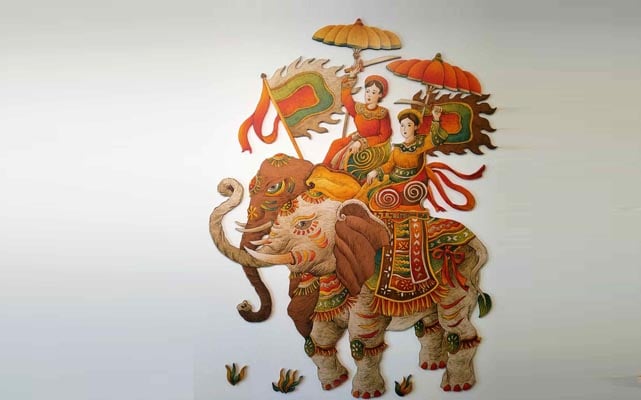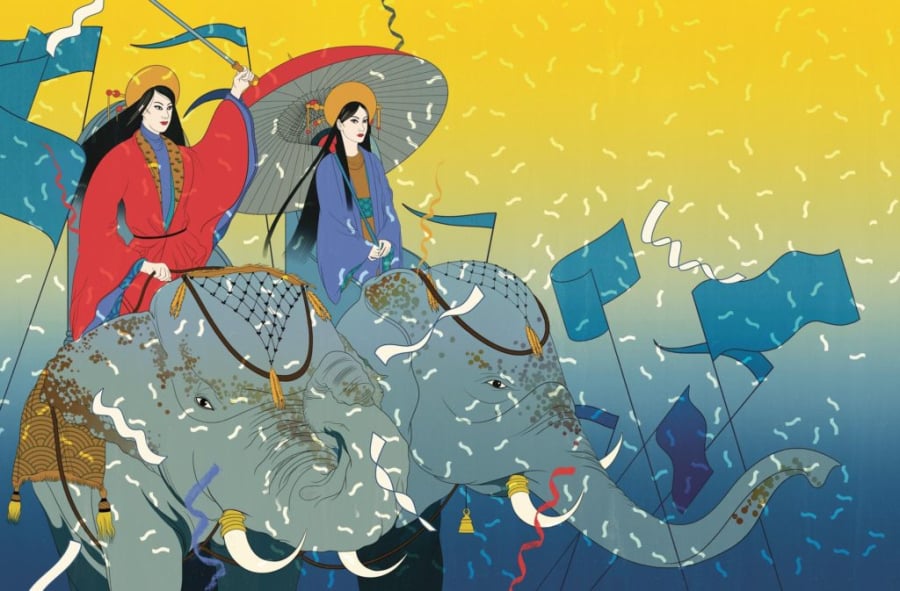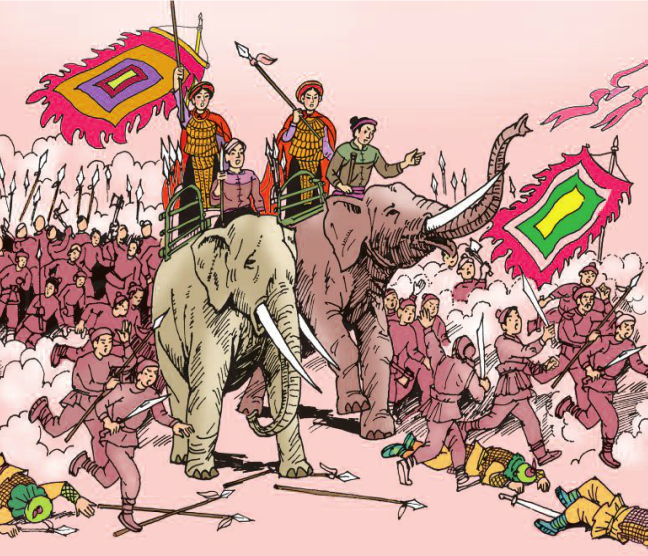By now, the name of the Trung Sisters, comprising Trung Trac and Trung Nhi, has been etched into the annals of history. Some sources posit that their true Vietnamese name could be Trung Chac and Trung Nhi, supposedly connected to the silk-making trade, akin to how the Vietnamese name of the Tran dynasty kings is believed to be derived from the fishing trade of their ancestors. Nevertheless, this hypothesis is not widely accepted due to a lack of scholarly evidence and appears to be based on personal conjecture. Other, somewhat mythical sources have recorded that the father of the Trung Sisters was named Trung Dinh (Hung Dinh), leading to the deduction that Trung could have been their family name.
The writer Phung Van Khai has recently introduced the character Trung Dinh in the opening chapters of his historical novel “Trung Nu Vuong,” positing him as the father of the Trung Sisters.
So, was “Trung” truly the surname of the Trung Sisters and where did the word “Trung” originate from? The answer may be different from what you have previously known.

Was “Trung” truly the surname of the Trung Sisters?
According to historical documents from Thailand, the Lava people in the northern part of the country once had an ancient kingdom called Yang or Yonok, with Ngeun Yang as its capital. In the process of assimilating Indian culture and becoming Thai, the name of this kingdom changed to Lanna, which means “A Million Rice Barns” in Thai.
Lava chronicles record that before the 4th century, their Queen Mother, who ruled over the land of Yonok, had the authority to grant fiefdoms and titles to her sons, while the King was responsible for trading activities with neighboring tribes. From the 4th century onward, both men and women in Lava society held political and economic power. However, the power of Lava women gradually diminished, and from the 7th century onward, only the names of Kings appear in the chronicles.
In the early 13th century, the Lanna court enthroned Me Ku, a woman, as their queen, believing that upholding tradition would help the country resist Burmese invasions. Upon her coronation, Queen Me Ku performed the traditional ceremony of becoming a Khun Chuang or Chuong – a leader believed to have the ability to resolve the kingdom’s political crises.
“Khun” was once used to refer to a father, then evolved to mean a leader or king in the ancient language of the Baiyue people and later in Thai, Muong, and Cham languages. “Khun” is also the origin of “Hung” in the word “Hung Vuong”.
“Chuong” is derived from “Yang”, an ancient Vietnamese word for a deity or heaven, which currently exists in the languages of the Mong, Ede, Bru-Van Kieu, and Vietnamese people, where it is known as “Giang”.
In the year 40, the Trung Sisters raised the flag of rebellion against the Han Dynasty’s domination and simultaneously performed the ceremony to become Khun Chuong, also known as King God or Queen of Heaven, hoping to “annihilate the enemy and continue the legacy of the Hung Kings”. This helps explain why the “Dai Viet Su Ky Toan Thu” records that the Trung Sisters were originally from the Lac clan and changed their surname to Trung upon ascending to the throne.
The Lava people are believed to be descendants of the Lac Viet people from Au Lac, who migrated southward to the Thanh – Nghe region, and later moved further westward after Au Lac was usurped by Trieu Da and especially after Nam Viet came under Han rule.
Upon establishing their new nation, they decided to retain the name of their former land. This is evident in the fact that the name Yonok implies a connection to ancient Au Lac, while Ngeun Yang is reminiscent of An Duong or Viet Thuong. According to Vietnamese historical records, Thuc Phan built a citadel in Viet Thuong and took the title An Duong Vuong. The names Van Lang, Viet Thuong, and An Duong are all phonetic variations of the ancient name Ya Yang, referring to both a tribe and the original country of the Vietnamese people.
Therefore, it is not surprising to find that the culture and language of the Lava people still retain many characteristics of ancient Vietnamese culture and language.

The Lava people are believed to be descendants of the Lac Viet people from Au Lac
The word “Me” in the name Me Ku corresponds to “Mi” in names such as Mi Nuong, Mi Chau, which originally meant “Mother”, referring to women from the royal lineage during the Hung Kings and An Duong Vuong periods, and later became “Me” to refer to people of royal descent during the Nguyen Dynasty.
It seems that what the Lanna court was trying to maintain was the matriarchal tradition. The ancient ceremony performed by Queen Me Ku was probably a ritual of becoming a Chuong – King God, similar to the ceremony performed by the Trung Sisters when they rose up against the Han Dynasty.
After the unsuccessful uprising, some of the Trung Sisters’ commanders fled to the mountainous regions to the west, notably the areas that are now Laos and Thailand. Some of the migrating Lac Viet people became the ancestors of the present-day Lao, Thai, and Khmu people.
From that起点, the title “Chuong” became sacred, associated with many kings, leaders, and legendary figures who fought against oppression and invasion, and was celebrated in the legends of many ethnic groups.
In the culture of the Thai people in Vietnam, there is the epic “Chuong Han,” where Chuong Han is depicted as a hero with an imposing physique and superhuman strength, always emerging victorious in battles.
In the tradition of the Lao people, the epic “Tao Hung” or “Tao Chuong” tells the story of Tao Chuong, a king said to have descended from heaven, who ruled over the land of Ngeun Yang – the homeland of the Lava/Lac Viet people.
As for the Khmu people, who live in Vietnam, Laos, and Thailand, they have tales and legends about Chuong Nhi (the connection to Trung Nhi is still a mystery), a young man who crafted a magical bronze drum from beeswax and later became a legendary general, guiding the Khmu people in agriculture, architecture, and community building, becoming a liberating hero for his people.
Similar to “Hung,” the title “Trung” is also recorded in history as a surname, and in fact, “Chuong” transformed into the surname “Truong” for some prominent figures in Vietnamese history.
Chuong, accordingly, became the surname of Truong Hong and Truong Hat – two river deities, also known in folklore as Mr. Long and Mr. Short. They are revered as the patron deities of 372 villages in 172 communes across 5 provinces along the Ca Lo, Cau, and Thuong rivers, and are also honored with the title of Saint Tam Giang. According to legends, they were once generals under Trieu Quang Phuc. After Trieu Viet Vuong passed away, they refused to serve under Ly Phật Tử and chose to commit suicide, and were later worshipped as sacred deities, appearing in dreams to support Ngo Quyen in his victory over the Southern Han army, as well as assisting Le Hoan and Ly Thuong Kiet in defeating the Song army. They were subsequently canonized as Do Ho Quoc Than Vuong – King Gods protecting the nation. The poem “Than”, considered to be the first Declaration of Independence of Vietnam, is said to have been composed as a divine revelation from the temples of these two deities.































